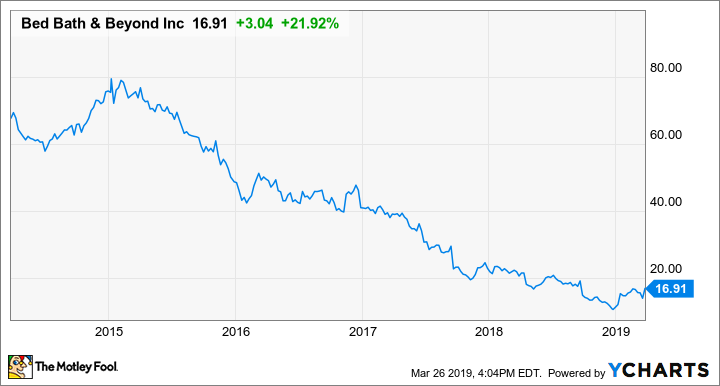Shares of Bed Bath & Beyond (BBBY) have been in free fall for most of the past five years. After peaking around $80 several years ago, Bed Bath & Beyond stock fell dangerously close to single-digit territory by late 2018, before rebounding with the rest of the market in 2019.
However, Bed Bath & Beyond stock moved sharply higher on Tuesday, surging 22% after a trio of activist funds launched a campaign to replace the company's board and CEO.
Bed Bath & Beyond Stock Performance, data by YCharts.
It's no surprise that investors are fed up with the struggling home goods retailer's performance. But while the stock is cheap, even the arrival of activist investors may not boost Bed Bath & Beyond stock for long. The rapid growth of lower-priced alternatives like TJX's (TJX 1.91%) HomeGoods chain could keep Bed Bath & Beyond under pressure for the foreseeable future.
Bed Bath & Beyond can't seem to get anything right
Nearly a year ago, Bed Bath & Beyond released a dreadful forecast for its 2018 fiscal year. The company called for adjusted earnings per share between $2.00 and $2.50, down from $3.12 a year earlier (and $4.58 the year before that). Adding insult to injury, Bed Bath & Beyond said that earnings would likely decline somewhat further in fiscal 2019, before (hopefully) returning to growth in fiscal 2020.
Sales and earnings trends have remained poor for most of the past year, even though Bed Bath & Beyond's Buy Buy Baby chain should have gained sales from the disappearance of Babies R Us, while the company's namesake chain should have benefited from the liquidation of regional department store operator Bon-Ton.
As a result, Bed Bath & Beyond slashed its guidance in September. The company indicated that it no longer expected to post full-year comp sales growth and that EPS would likely come in around $2.
Bed Bath & Beyond cut its sales forecast again in early January, after reporting a 1.8% comp sales decline in Q3. Full-year comp sales are on track to be down about 1% year over year. (Bed Bath & Beyond will release its Q4 results in April.) The only good news was that the company now thinks it will be able to hold EPS roughly flat in fiscal 2019. However, that prediction may not be worth much, given that Bed Bath & Beyond has a poor track record of hitting its forecasts.

Bed Bath & Beyond's profitability has eroded rapidly in recent years. Image source: Bed Bath & Beyond.
Agitating for change
With Bed Bath & Beyond still flailing away, three small activist funds -- Legion Partners Asset Management, Macellum Advisors, and Ancora Advisors -- are looking to remake the company's board and management.
The three funds, which together own about 5% of Bed Bath & Beyond's shares, have proposed 16 candidates for the board of directors, in a bid to unseat the entire 12-person board. They also want to oust longtime CEO Steven Temares, who has led the company since 2003. Lastly, they are calling for an improved merchandise assortment and the divestment of smaller brands like Buy Buy Baby, Cost Plus World Market, and Christmas Tree Shops.
Many of these proposals seem sensible. The funds note that the average tenure of the company's existing directors is nearly 19 years, which suggests a lack of independence and a need for fresh ideas. And while Bed Bath & Beyond performed well during the first half of Temares' tenure, he has more recently presided over a long period of falling profitability. Lastly, with the core business in need of a big revamp, Bed Bath & Beyond's other brands may be too much of a distraction.
Still, it's not clear who would buy Bed Bath & Beyond's noncore retail banners, or how much they would fetch in a sale. Moreover, new leadership won't necessarily lead to better results.
Bed Bath & Beyond lacks a competitive advantage
The real problem for Bed Bath & Beyond is that it has no clear competitive advantage to help it stay on top in today's retail environment. Its prices aren't especially low, most of its merchandise isn't unique, and it faces a lot of competition. The last of these problems will only become more acute over time.
Off-price retail giant TJX Companies has been aggressively chasing growth in the U.S. home furnishings market. As of early February, TJX operated 765 HomeGoods and HomeSense stores in the U.S., up from 526 three years earlier. Over the same period, the HomeGoods segment (which includes both banners) has grown its sales by 48%, from $3.9 billion to $5.8 billion, as shoppers flock to its low prices and treasure-hunt atmosphere.
TJX believes there is room for it to operate at least 1,400 HomeGoods and HomeSense stores in the U.S. in the long run. Even assuming modest comp sales growth, this implies that TJX plans to more than double its home furnishings revenue over the next decade. A meaningful chunk of that growth is likely to come at the expense of Bed Bath & Beyond.
With steadily falling customer traffic and in-store sales, it will be tough for Bed Bath & Beyond to find enough cost savings to stabilize its profitability in the long run. As a result, investors shouldn't be tempted to bet on a recovery for Bed Bath & Beyond stock.






